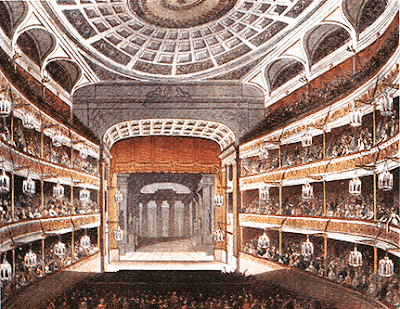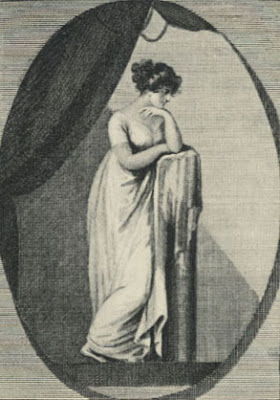 As I mentioned last week, I’m currently playing the role of Paulina in a local production of Shakespeare’s lovely and slightly bizarre tragical comical romantical problem play, The Winter’s Tale.
As I mentioned last week, I’m currently playing the role of Paulina in a local production of Shakespeare’s lovely and slightly bizarre tragical comical romantical problem play, The Winter’s Tale.
(For more on the story of the play, and some neat RSC pics, see last week’s post: Shakespeare’s The Winter’s Tale, pt. 1. And for more neat pics, and some great historical theatre info, see the RSC website.)
I have skimmed Garrick’s odd mini-play version of The Winter’s Tale, which he called (at least in his published versions) Florizel and Perdita (which is pretty much just the second half of Shakespeare’s version, with Garrick additions and rejumblings), and am working on getting my hands on Kemble’s acting version of TWT (I thought I had it, but I was mistaken), so I will talk more about the different Regency-era versions of the text in a later post.
 Here is a portrait by Gainsborough of Mary Robinson, also known as “Perdita,” who drew the eye of the young Prince of Wales (later Regent, still later George IV) when she played Perdita at Drury Lane in 1779.
Here is a portrait by Gainsborough of Mary Robinson, also known as “Perdita,” who drew the eye of the young Prince of Wales (later Regent, still later George IV) when she played Perdita at Drury Lane in 1779.
Mary Robinson later wrote of her first encounter with the Prince during her performance in Florizel and Perdita (which she refers to as “The Winter’s Tale,” although it was the half-length version which Garrick had adapted):
The play of THE WINTER’S TALE was this season commanded by their Majesties. I never had performed before the royal family; and the first character in which I was destined to appear was that of PERDITA. I had frequently played the part, both with the Hermione of Mrs Hartley and of Miss Farren: but I felt a strange degree of alarm when I found my name announced to perform it before the royal family.
 In the Green-room I was rallied on the occasion; and Mr Smith, whose gentlemanly manners and enlightened conversation rendered him an ornament to the profession, who performed the part of Leontes, laughingly exclaimed, ‘By Jove, Mrs Robinson, you will make a conquest of the Prince; for to-night you look handsomer than ever.’ I smiled at the unmerited compliment, and little forsaw the vast variety of events that would arise from that night’s exhibition!
In the Green-room I was rallied on the occasion; and Mr Smith, whose gentlemanly manners and enlightened conversation rendered him an ornament to the profession, who performed the part of Leontes, laughingly exclaimed, ‘By Jove, Mrs Robinson, you will make a conquest of the Prince; for to-night you look handsomer than ever.’ I smiled at the unmerited compliment, and little forsaw the vast variety of events that would arise from that night’s exhibition!
 I hurried through the first scene, not without much embarrassment, owing to the fixed attention with which the Prince of Wales honoured me. Indeed, some flattering remarks which were made by his Royal Highness met my ear as I stood near his box, and I was overwhelmed with confusion.
I hurried through the first scene, not without much embarrassment, owing to the fixed attention with which the Prince of Wales honoured me. Indeed, some flattering remarks which were made by his Royal Highness met my ear as I stood near his box, and I was overwhelmed with confusion.
The Prince’s particular attention was observed by every one, and I was again rallied at the end of the play. On the last curtsy, the royal family condescendingly returned a bow to the performers; but just as the curtain was falling, my eyes met those of the Prince of Wales; and, with a look that I never shall forget, he gently inclined his head a second time; I felt the compliment, and blushed my gratitude.
Questions for the day (answer any or all!): What Shakespeare plays did you study in school? Did you think the teacher(s) taught Shakespeare well, or in such a way to make the students bewildered bard haters? Do you think Shakespeare is better seen than read? Why do you think Shakespeare was so popular during the Regency?
Cara
Cara King, author of My Lady Gamester (which contains no Shakespeare, but does have a character named Richard)






